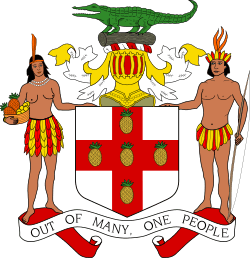Jamaican general election, 1983
 |
| This article is part of a series on the politics and government of Jamaica |
|
|
|
|
|
Politics portal |
Early general elections were held in Jamaica on 15 December 1983.[1] The election was boycotted by the main opposition party, the People's National Party, in protest at the refusal of the ruling Jamaican Labour Party to update the electoral roll.[2] Whilst several minor parties participated in the election, most seats were unopposed: in the six seats where voting took place, voter turnout was about 55%, so this translated into a nationwide figure of 2.7%.[1][3] It allowed the Labour Party to win all 60 seats in the House of Representatives, with their leader, Edward Seaga, continuing as Prime Minister.
Background
The Labour Party had won the 1980 general elections in convincing style, taking 51 of the 60 seats in the House of Representatives. At the time the party promised to update the electoral roll, but had failed to do so by the 1983 elections.[2] On 25 November 1983 Seaga called early elections, two years before they were due.[3] Seaga claimed that the move was due to People's National Party leader Michael Manley calling for him to resign from his post of Finance Minister (which he held in addition to being Prime Minister), and that the early elections would be a public vote of confidence in his austerity plans.[3]
Whilst the People's National Party boycotted the elections and called for others to do so as well, three minor parties and several independents contested the elections. Two of the parties, the Christian Conscience Movement and the Jamaica United Front, had never previously contested an election. The other, the Republican Party, had run in the 1955 and 1967 elections, but had never received more than 108 votes.[4] Between them, opposition and independent candidates only contested six constituencies, resulting in Labour Party candidates winning 54 seats unopposed. Whilst turnout in the contested seats was estimated to be around 55%,[3] the overall total was just 2.7%, by far the lowest in the country's history and the only time it has been below 50%.[1]
Results
| Party | Votes | % | Seats | +/- |
|---|---|---|---|---|
| Jamaica Labour Party | 23,363 | 89.7 | 60 | +7 |
| Christian Conscience Movement | 704 | 2.7 | 0 | New |
| Republican Party | 257 | 1.0 | 0 | New |
| Jamaica United Front | 144 | 0.6 | 0 | New |
| Independents | 1,587 | 6.1 | 0 | New |
| Invalid/blank votes | 488 | – | – | – |
| Total | 26,543 | 100 | 60 | 0 |
| Source: Nohlen | ||||
Aftermath
The Labour Party government was sworn in on 19 December,[3] and remained in power until the 1989 elections, in which the People's National Party won 45 of the 60 seats.[5]
References
| ||||||||||||||||||